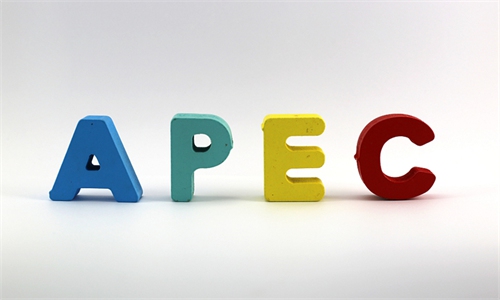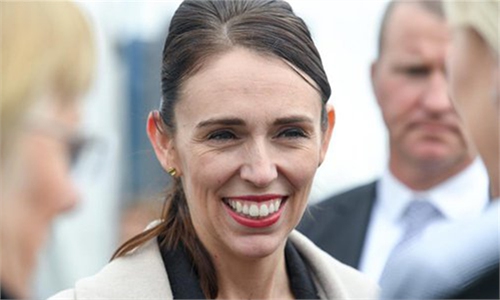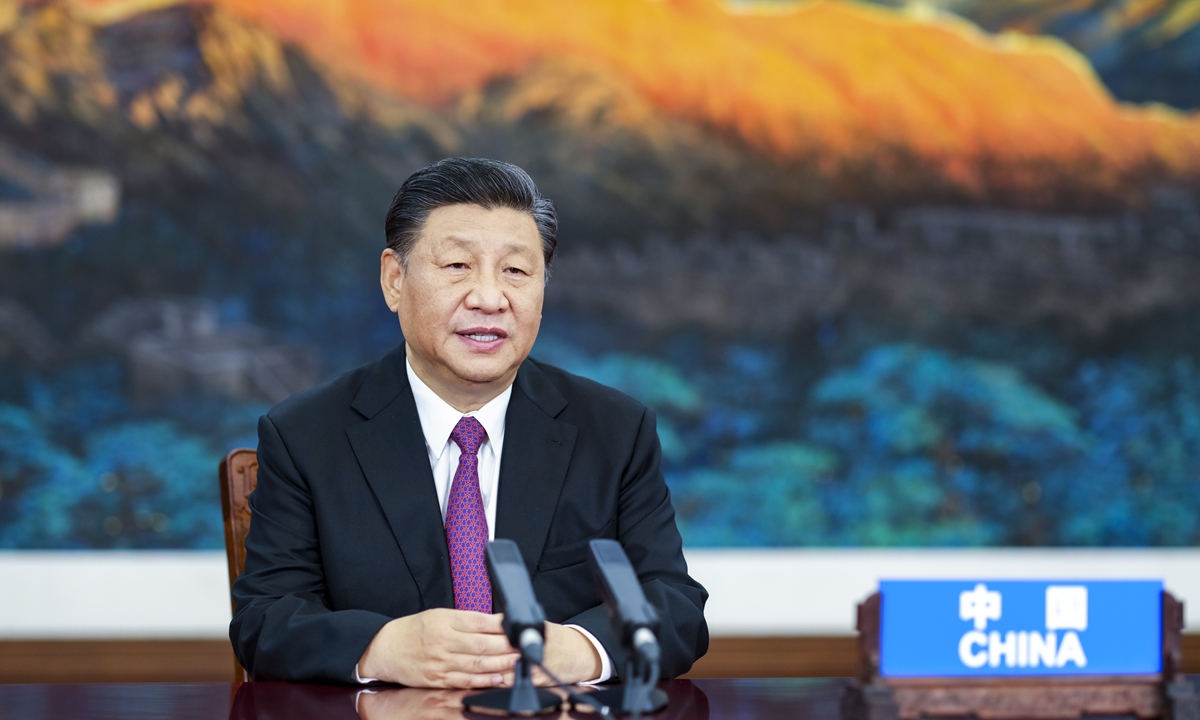
President Xi Jinping attends an informal leaders' meeting of the Asia-Pacific Economic Cooperation from Beijing via video link on Friday. Photo: Xinhua
China has provided more than 500 million doses of vaccines to other developing countries, and will provide another US$3 billion in aid over the next three years to support COVID-19 response and economic and social recovery in other developing countries, Chinese President Xi Jinping said at the APEC Informal Economic Leaders' Retreat via video link in Beijing on Friday night.
China has financed the founding of a Sub-Fund on APEC Cooperation on Combating COVID-19 and Economic Recovery, which will help APEC economies win an early victory over COVID-19 and achieve economic recovery, Xi said.
Xi said China supports waiving intellectual property rights on COVID-19 vaccines, and will work with other parties to push for an early decision by the World Trade Organization (WTO) and other international institutions.
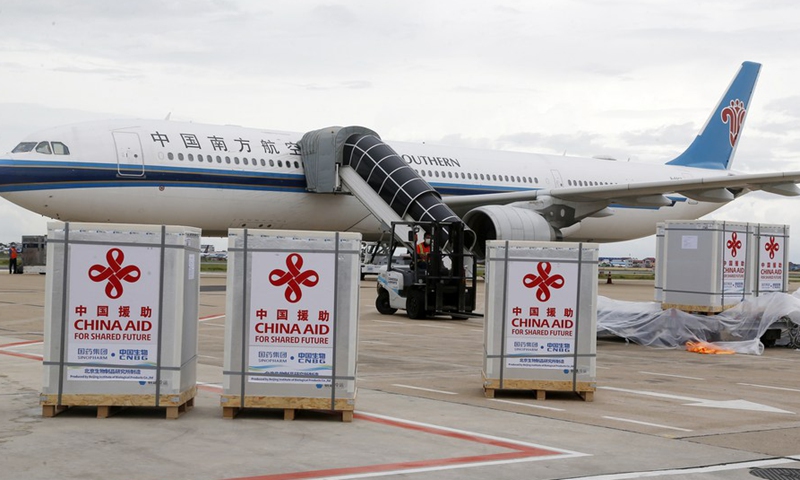
vaccine donation Photo:Xinhua
China will take an active part in cooperation initiatives to keep vaccine supply chains stable and safe, and support the movement of essential goods, Xi said.
He stressed that the global digital economy is an open and closely knit entity. Win-win cooperation is the only way forward, while a closed-door policy, exclusion, confrontation and division would only lead to a dead end, Xi said.
We need to ensure the full and balanced implementation of the APEC Internet and Digital Economy Roadmap, further develop the digital infrastructure, facilitate the dissemination and application of new technologies, and work for a digital business environment that is open, fair and non-discriminatory, he said.
Xi, US President Joe Biden and other world leaders met virtually on Friday night during the informal leaders' meeting of the APEC.
New Zealand, the revolving APEC host, said this week it would chair the extraordinary meeting ahead of a formal gathering in November, the first time such an additional meeting has been held, Reuters reported.
The meeting was conducted at a critical time when the world is facing a resurgence of COVID-19 and the international cooperation against the virus has entered a new stage, and also when the US' Asia-Pacific policy which aimed at forming cliques and inciting confrontations has shattered unity and added more difficulties to regional countries plagued by the pandemic, observers said.
China has been providing medical supplies, COVID-19 vaccines and other necessary help to the world for long, while the US has engaged in overt political manipulation, from hyping the China "lab-leak" theory to muffling scientists and experts upholding objectivity.
This week, Chinese COVID-19 vaccine producers Sinopharm and Sinovac reached advance purchase agreements with the Global Alliance for Vaccines and Immunization (GAVI) to provide as many as 550 million doses vaccines for the world through the COVAX Facility, a move that would largely help the world tackle the raging Delta variant and build immunity.
On Tuesday, Papua New Guinea become the third Pacific island country after the Solomon Islands and Vanuatu, to roll out Chinese vaccines domestically.
China is also helping Southeast Asia which has been struggling with coronavirus spike. Chinese Foreign Ministry said on Thursday that China will provide Indonesia with COVID-19 vaccines and oxygen concentrators and is willing to work with Indonesia to deepen vaccine research cooperation.
Exacerbated by the more transmissible Delta variant, the US has seen COVID-19 vaccination rates down and cases on the rise in recent days.
"We're losing time here. The Delta variant is spreading, people are dying, we can't actually just wait for things to get more rational," Francis Collins, director of the National Institutes of Health, told CNN on Wednesday. US health experts warned that more challenges will come in the next two weeks with hospitals close to reaching limit.
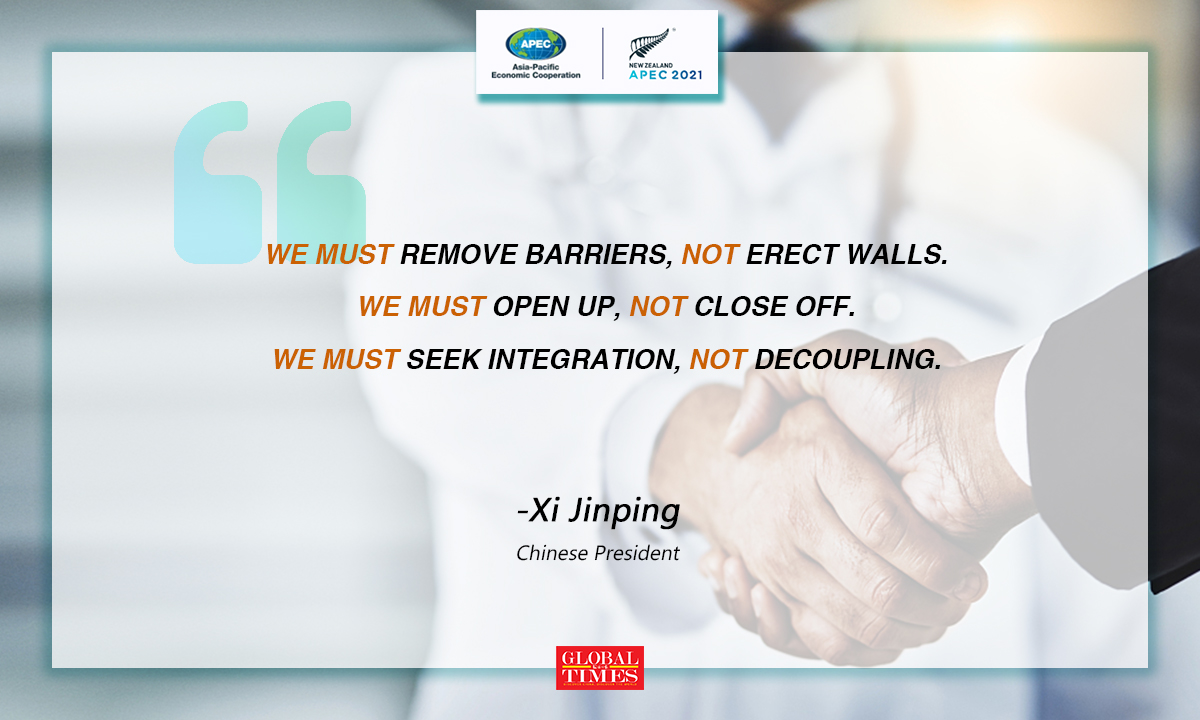
Graphic: Xu Zihe/GT
Indo-Pacific policy to fail
According to the White House, Biden's participation demonstrated US leadership in the Indo-Pacific region.
"As President Biden's first engagement with many of the APEC Leaders, particularly those in Southeast Asia, he will emphasize the importance he places on the region as well as his vision for a free and open Indo-Pacific," according to the White House statement.
Li Haidong, a professor at the Institute of International Relations at China Foreign Affairs University, told the Global Times that the US with its extremely self-centered and hegemonic Indo-Pacific policy apparently aimed at turning the APEC meeting a new platform to lure other countries to split the region.
For the US, maintaining and strengthening its leadership in the region is its sole purpose, and regional countries' economy and people's livelihood have never been on its list, Li said.
Most countries will focus on their own interests that Biden's Indo-Pacific policy cannot bring, making its policy impossible to succeed, analysts said.
The APEC economic leaders' statement issued after the meeting highlighted overcoming COVID-19 and accelerating economic recovery. The statement said the APEC economies will redouble efforts to expand vaccine manufacturing and supply, and will target measures where they are needed to facilitate job creation and inclusive economic recovery.
The Biden administration has overestimated its strength and global influence, Li said.
"How could the ASEAN members and other countries count on it when the US itself has been deeply mired in pandemic and struggling with the economy?" Li asked.
The world understands the US' real role in the international arena which is splitting regions, just like what it did to Afghanistan and its neighboring countries, and APEC members will not allow it to shatter the unity of the region and sabotage the joint effort in fighting against the pandemic, Li said.
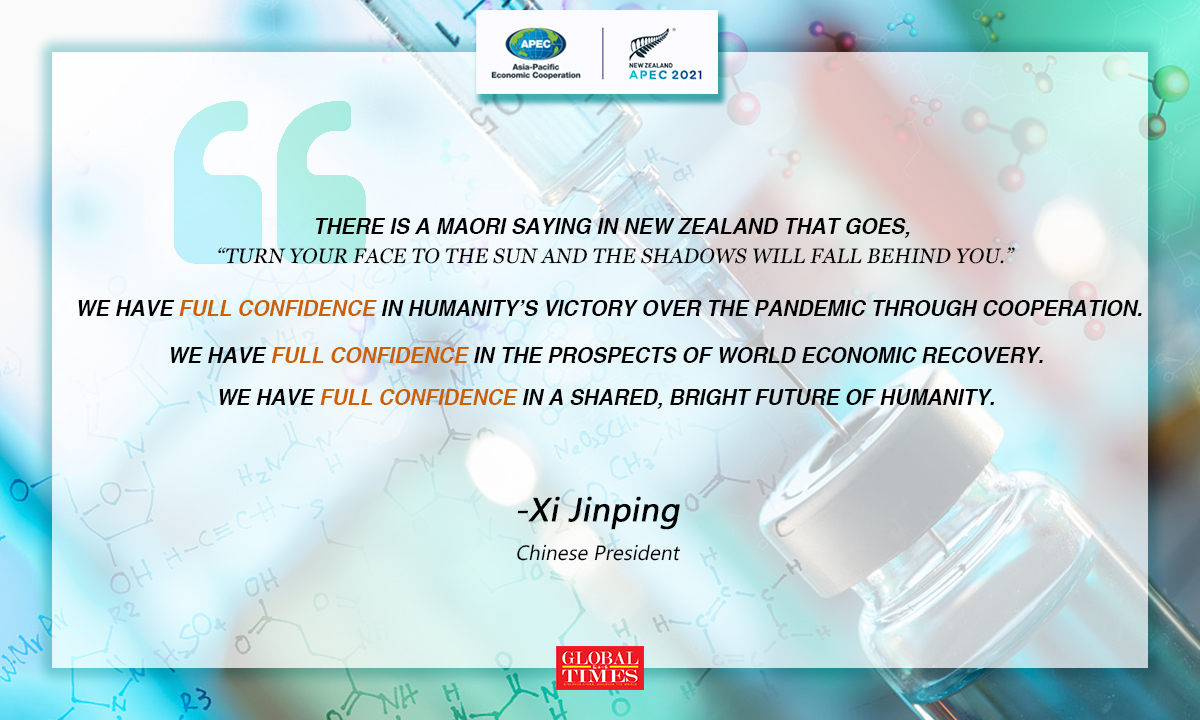
Graphic: Xu Zihe/GT
In 2020, the APEC GDP contracted by 1.9 percent, the largest decline since the World War II. Even though APEC said continued fiscal measures led to a rise in government consumption, improved investment and household consumption, around 81 million jobs in the region were lost.
The priority to achieve economic recovery is to ensure the stability of supply chains, and China must strengthen such issue from rules-making perspective within the APEC framework, considering growing disruptions to global supply chain and mounting attempts to wipe out China's participation across the global value chain, Wang Yiwei, director of the institute of international affairs at Renmin University of China, told the Global Times.
"The middle-class population of a country largely decides its power and duty in globalization. As China has about 400 million middle class nationals - equal to the total number of the middle-class people in all developed countries, there is a growing demand for the country to enhance its discourse power in the multilateral framework, to shift the US dominance in rules-making," he said.
China's and the US' economies mingle for the longest period of time in the Asia-Pacific region compared with other regions, Wang said.
Their sizeable economies are tangible, pillaring a stable global economy, unlike the Indo-Pacific advocacy hyped by the US that could not provide any real value in terms of practical economic cooperation, Wang noted.
"Unfortunately, the Biden administration has not jumped out of the shadows of the legacy policy championed by Trump, including US protectionism, an easing monetary policy and imposition of tariffs. As the sign of returning to the Trump era looms over the world, how the two largest economies could avoid decoupling and a Cold War mentality would remain an important agenda among APEC economies," he told the Global Times.
The international economic cooperation should be based on promoting the connectivity of different economies, and we should abandon trade barriers and economic nationalism, Li said.
And rules on the new economic means such as digital economy should be decided by equal negotiations of members rather than the US' self-righteousness, Li said.


